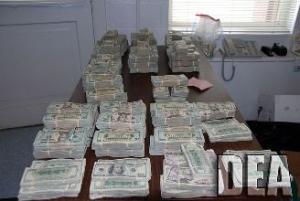Drug War Issues
Politics & Advocacy
American undercover agents, primarily with the DEA, have laundered or smuggled millions of dollars in drug proceeds from Mexican drug trafficking organizations as part of their investigations into how the cartels operate, The New York Times reported Sunday. The newspaper cited "current and former federal law enforcement officials."

The DEA seized this money, but it has laundered millions for the Mexican drug cartels. (Image: DEA)
The agents took shipments of hundreds of thousands of dollars in cash across borders and deposited them in traffickers' accounts or shell accounts set up to launder the funds. Their activities allowed the cartels to launder funds for months or even years while investigations proceeded.
As the Times noted, "The high-risk activities raise delicate questions about the agency's effectiveness in bringing down drug kingpins, underscore diplomatic concerns about Mexican sovereignty, and blur the line between surveillance and facilitating crime."
"Building up the evidence to connect the cash to drugs, and connect the first cash pickup to a cartel's command and control, is a very time consuming process," explained one anonymous former DEA official. "These people aren't running a drugstore in downtown LA that we can go and lock the doors and place a seizure sticker on the window. These are sophisticated, international operations that practice very tight security. And as far as the Mexican cartels go, they operate in a corrupt country, from cities that the cops can't even go into."
But as the Times noted, "It is not clear whether such operations are worth the risks. So far there are few signs that following the money has disrupted the cartels' operations, and little evidence that Mexican drug traffickers are feeling any serious financial pain. Last year, the DEA seized about $1 billion in cash and drug assets, while Mexico seized an estimated $26 million in money laundering investigations, a tiny fraction of the estimated $18 billion to $39 billion in drug money that flows between the countries each year."
The DEA money laundering operations raise concerns similar to those raised by members of Congress about a Bureau of Alcohol, Tobacco & Firearms (ATF) effort, Operation Fast and Furious, in which ATF allowed low-level smugglers to buy guns in the US and transport them to Mexico in a bid to find higher-ranking cartel operatives. ATF lost track of hundreds of those guns. Some turned up at Mexican crimes scenes and two were found on the US side of the border where a Border Patrol agent had been shot to death.
This work by StoptheDrugWar.org is licensed under Creative Commons Attribution-ShareAlike 4.0 International
Comments
DES fiasco?
We are not safe in our daily
We are not safe in our daily life.
Too profitable a business
The tragedy for drug producing countries in general, and Latin American countries in particular, is that Prohibition has made the illicit drug market an extremely successful business, too profitable for its own good. At US$320,000 millions PERYEAR, this market ranks third amongst the more lucrative business in the world, and its revenue is higher than the GDP of 84% of the countries in the world.
More significant, perhaps, is the fact that only a tiny fraction (some estimates talk of as little as 5%) of the revenues generated by the illegal drug market worldwide manages to make its way back into the economies of drug producing countries.
It should not come as a surprise, then, to find that a host of interested parties, not just the US military establishment, the international financial system and the scavengers that are fed by and feed on it, are willing to fight to death, literally and metaphorically, anyone trying to kill the proverbial goose that lays the golden egg.
To add insult to injury, the policy of the US, the largest drug consumer in the world and the most belligerent war on drugs warrior, has always been to force others to deal with the mess it has created in the first place. The fact is that the US likes “exporting” its internal conflicts and “demanding” other countries to fight its fights. It is also the logic of its foreign policy: wage war on foreign lands — be it in the form of low intensity wars like the War on Drugs, or high intensity ones, like the War on Terror (see the pattern?) — in order to isolate the US from the fallout from pursing its economic, political and strategic interests whatever the cost…for others.
It explains why the country that swaggers about lecturing everybody about the rule of law, democracy and human rights, is the same country that ignores international law, practices extraordinary rendition, tortures, wages illegal wars, finances mercenaries, uses unmanned drones to carry out extra-judicial killings, and is the largest beneficiary of the war on drugs proceeds.
As unfortunate as it is for Latin America, there is nothing paradoxical, unusual or unexpected in the US behaviour: it is what dominant powers are meant to do. The Romans did it and the British did it, too.
Gut reaction
Add new comment